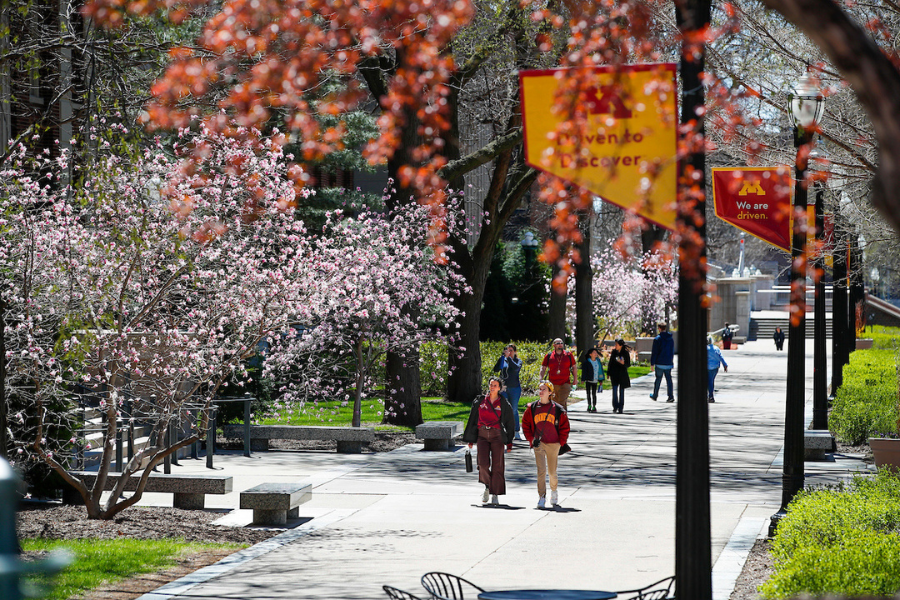
Annual report reflects continued progress and commitment to long-term goals with Tribal Nations
Rebuilding and strengthening the University of Minnesota’s relationships with Tribal Nations and Indigenous communities is a priority included in MPact 2025, the five-year strategic plan launched by the University in 2021. At its June meeting, the Board of Regents will review progress in this work during the past year, as well as actions and future considerations stemming directly from the landmark TRUTH Report.
The Towards Recognition and University-Tribal Healing (TRUTH) Report, produced by Minnesota’s 11 Tribal Nations and other contributors, provides a thoroughly researched, analyzed and consulted report on the shared history of the U of M and Minnesota’s Indigenous people. While documenting how the University and its work have affected Tribes throughout its history, the report also outlines how the University can solidify lasting relationships with Tribes and Indigenous peoples.
“Regular engagement with the Minnesota Indian Affairs Council, Tribal leaders and community members to listen, collaborate and take meaningful action toward open and respectful relationships has been a priority for this Board and University leadership in recent years,” said Board Chair Janie Mayeron. “After we received the TRUTH Report last spring, my Board colleagues and I asked Interim President Jeff Ettinger and his leadership team to fully review the report and recommend next steps for us to consider as part of our ongoing commitment to working in partnership with Tribal communities. I look forward to discussing this important mission-related work.”
Karen Diver, senior advisor to the President and head of the Office of Native American Affairs, will update the Board on new and existing initiatives that serve Native American learners and communities, emphasizing activities aligned with TRUTH Report recommendations.
Diver’s report highlights the value of relationships with Tribal leaders, the Minnesota Indian Affairs Council and American Indian Advisory Boards across the University System to receive feedback and shape priorities. The University’s commitment to open dialogue and listening has focused on student support, research guidance and Native American education, including:
- Transitioning the University’s Native American Promise Program from its original focus on tuition assistance to address another barrier identified by Tribal leaders: student housing costs. The housing aid provided through the University’s program supported 38 incoming first-year students in the 2023-2024 academic year.
- Creating the University’s Indigenous Research Policy, which is anticipated to have final approval by the end of June. This policy will inform U of M research practices that ensure respect for the rights of Tribes as sovereign nations. Once approved, this will make the U of M the first of America’s leading research universities to have such a policy guiding community-engaged scholarship for Tribes and Indigenous peoples.
- Adding a doctoral program in the American Indian Studies department — a first for the 55-year-old program that’s the oldest of its kind in the nation. The University anticipates the American Indian Studies program and other resources available to Native American students will move to a renovated space in Pattee Hall on the Twin Cities campus ahead of the fall 2025 semester.
Diver’s report cites a number of systemwide examples, reflecting the University's focus on commitments to Native American communities. More details on this work can be found on the U of M’s Office of Native American Affairs website.
Also in June, the Board is expected to:
- Adopt its 2024-25 meeting schedule.
- Continue discussions on health sciences strategic planning with the deans of the six health sciences schools.
- Act on the administration’s recommended fiscal 2025 capital improvement and operating budgets.
- Review the Rochester Campus Plan with Chancellor Lori Carrell; Monique MacKenzie, planning director for Planning, Space and Real Estate; and Shane Stennes, chief sustainability officer.
- Discuss the University’s centrally held endowment with Andrew Parks, chief investment officer.
- Receive an update on enrollment coordination in a systemwide look at strategic enrollment planning across the University’s campuses.
- Act on proposed amendments to Board of Regents Policy: Tuition and Fees.
- Act on the resolution related to the revocation of the honorary naming of Nicholson Hall.
- Receive annual reports from governance leaders representing faculty and staff.
- Recognize outgoing Interim President Jeff Ettinger.
For more information, including future meeting times, visit regents.umn.edu.
- Categories:
- Campus Affairs
- Board of Regents





